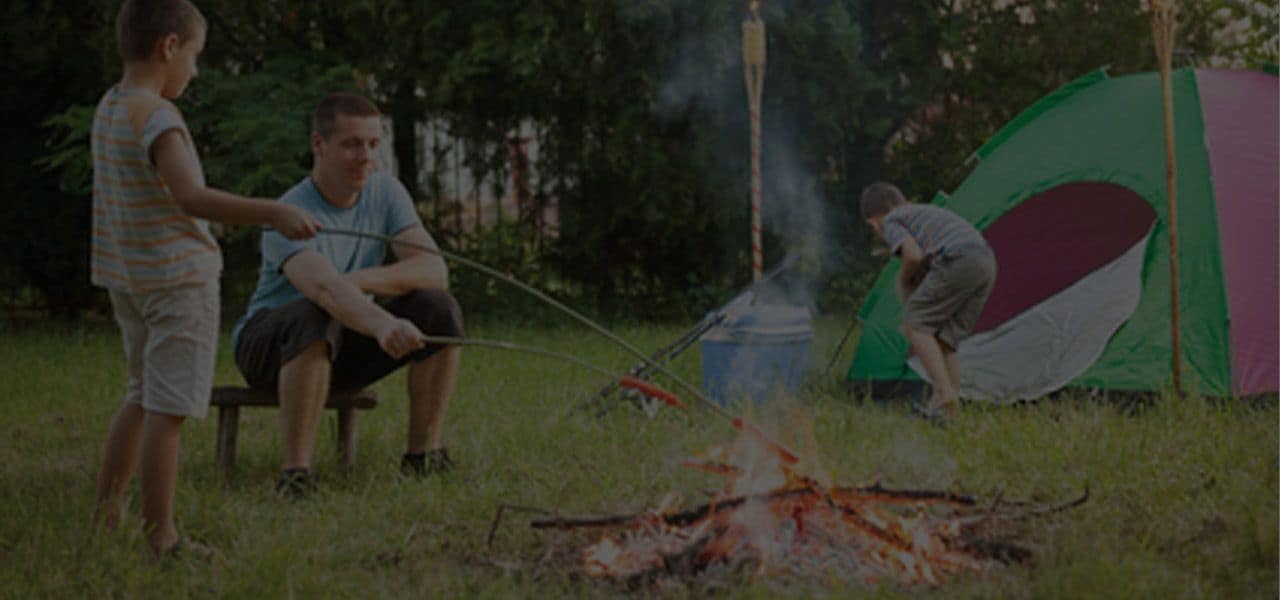The 6 Most Basic Survival Skills You Need to Know
When confronted with the totality of calamity that might befall you in any given disaster it is easy to feel overwhelmed, outmatched and lacking in confidence, especially if you have not been flexing your readiness muscles for very long or very often.
After all, who are you but knee-high to no one? You aren’t some muscled, bearded survival expert, deep woods guru or snake-eating jungle commando.
No, you are just a guy or gal who wants to be as ready as they can be when the train car of life flips off the tracks with terrible consequences. Maybe one day you’ll be the steely, gung-ho survivor archetype, but that day is not today.
With all the information channels bombarding our waking hours constantly, each trying to outdo the last in the relentless quest for our attention, one can be forgiven for being completely bewildered on where they should start learning, applying and practicing survival skills. Every person and outfit on the internet has their own ideas.
The good news is that everyone started somewhere. Insert your favorite quote here about a journey of a thousand miles yadda, yadda, yadda. Well, I suppose I am no different than all those other people on the internet in that I do have an opinion on where you should start, but mine is supported by the infallible principle of reducing complex concepts down to their simplest fundamental elements.
In essence, there are no advanced techniques; only more intricate and specialized applications of the fundamentals. Below is my list of six fundamental skillsets you should be honing if you are starting from zero and trying to make hero-status. Even if you are a seasoned prepper, if you are deficient in any one of these areas you need to clutch in and come back around to shore up your weaknesses.
Essential Skills to Pay the SHTF Bills
As you peruse this list I will take the time to explain in general the depth and breadth of competency you should be striving to attain in each skill, as well as sprinkling a few examples of relevant situations that you might need to make use of them.
Some of those situations may not seem like proper disasters to you, or big, scary TEOTWAKI events that mean life as you know it is over. That is deliberate on my part: you are far, far more likely to need to call on your survival skills to deal with a small scale but still serious event, (a micro-disaster, if you will) than a major catastrophe you see topping the lists on frequent survival hangouts.
Just as importantly, in the event that you are caught up in a major crisis or its aftermath you’ll certainly need these skills then also. The biggest difference you’ll be dealing with is one, simply, of scale as hard as that may be to believe. A car crash can produce just as much carnage, and do just as much damage to the human body as a tornado can, it just does it in a much more localized area than the twister.
Thirst is a major concern when lost in the woods, whether you are wandering after a wrong turn on your pleasure hike or trying desperately to survive as you bug-out to greener pastures. Need will be the ultimate arbitrator no matter the scenario. Needs don’t change. Other circumstances may, but need always remains. That’s why these basic skills are so important.
Without any more ado, let’s get to our list.
#1 – Cultivate a Problem-Solving Mindset
This in particular is skill I see so often neglected by well-meaning but misguided proponents of self-sufficiency. Folks try to cheat this most crucial of steps by pouring tons of gear and talk on it. But you cannot cheat the mountain, as the saying goes. When the chips are down, alone or with others, your mind is your first tool, first weapon and simultaneously your greatest asset or most glaring liability.
If you cannot get your attitude and thinking right you are probably doomed from the start. The unquiet mind of a person prone to histrionics, naysaying, pessimism and self-assassination is going to face a tough row to hoe no matter what happens. People like this will be slower to react, make poor decisions and generally waste a bunch of energy on meaningless self-criticism, looking to assign blame, and other useless actions instead of taking stock, strapping down and applying the correct solution, or at least trying to discern the best course of action.
If you believe you are going to make it, you will. If you believe you are screwed, that’s probably true. Don’t give in to the demons in your head! Start snuffing out any negative or wasteful self-talk now and bend your thoughts and your will toward solutions for all issues you encounter in life. Cultivate a mindset of “I know what to do” or “I’ll figure it out,” and then get to figuring.
You must problem solve all kinds of mundane issues in your daily life. Doing so in a crisis is no different; the stakes are just a little higher! Make it a point to come up with creative and improvised solutions to all kinds of problems using what you have on hand, can procure quickly or craft. Exercises like this will help you take stock of your environment, resources and timetables for completion quickly.
If your default mode for problem solving is always “order it off Amazon,” “tell my spouse” or “pay someone to make it go away” you are not setting yourself up for success in a disaster. Once you have enough practice at trouble-shooting your problems, you’ll notice solutions jump out at you. You’ll be rifling through stacks of tasks and setbacks with a speed and confidence you previously thought impossible.
That’s a skill that will make the difference between life and death in a tough spot when the lives of you and yours may hang in the balance.

#2 – Shelter Creation and Thermoregulation of Body Temperature
The default image of a prepper stuck outside or in the woods is one of a man or woman with a bushcraft knife, a hank of paracord and little else. With nightfall or bad weather approaching they set to work speedily erecting a primitive structure that looks for all the world like a cabin or hobbit hole in miniature.
A fine skill to have, no question, especially if you make it a point to travel in remote and austere places, but there is more to shelter and the life-saving warmth or cooling shade it can provide than wilderness and primitive techniques. Some of you will not wind up in the woods in a disaster. Heck, some of you don’t live within a couple hundred miles of a forest!
You should make it a point to learn how to make the most of man-made materials as well as create “micro-climates” inside your own home in case you lose power or your home loses its roof or structural integrity. Don’t assume that just because you can stay in your home during a crisis that you can drop a sleeping bag on the floor and call it good, or even sleep in your own bed.
Think about the aftermath of tornadoes, blizzards and other highly destructive disasters. If you live in Florida and are in a home with no power in the summertime, illness or even death is a very real possibility. The same goes for very cold climates in which your home loses power.
By utilizing “indoor camping” techniques, insulation, blocking or increasing sunlight and/or breezes coming into rooms and getting higher or lower to take advantage of favorable air temps you can maintain your core temperature, perhaps even remain comfortable.
This is not to say you should neglect outdoor shelter techniques suitable to whatever climate you frequent. You definitely should work those skills as you never know when a break-down or stranding may force you to call on them, but not before you learn the fundamentals of regulating your body temperature and can do so in a “bug-in” scenario.

#3 – First-Aid Skills
More than almost anything else a prepper might learn and any other skillset they might develop, medical skills top the list when it comes to ones you will likely use for real at some point. Far from some post-apocalyptic triage or field surgery situation, first-aid know-how will come in handy in all kinds of lesser, “boring” events.
From car wrecks to slips, trips and falls, power tool mishaps and negligent discharges of firearms, there are 101 daily activities that could go bad and require medical intervention in a blink of the eye. Calling 911 may not be an option for all kinds of reasons. Even if they are available, an injury to yourself or others may be bad enough to require immediate care.
The watchword is “you are your own first-responder.” A well-drilled amateur practitioner of first-aid should be able to perform CPR and treat a variety of lacerations, penetrating injuries and burns. Knowing how to immobilize a fracture is handy. Treating shock and symptoms of illness is important. Essentially we are going for, as a starting point, a mix of traditional first-aid and basic trauma care.
You’ll need the right tools and supplies to do this well, so assembling a personal first-aid kit (a real one, not that dinky $10 plastic one you can get at Target) is part of this entry. At the bare minimum keep a few pressure dressings, gauze rolls, antiseptic wash and a tourniquet in there along with some disposable gloves to keep blood and other germ-bearing body fluids off of you.
These are not skills you want to improvise or cobble together out of self-study. Doing this stuff wrong can make things worse or even kill someone. Seek out good training, even if it just from a local Red Cross class or one put on by your local fire department or EMS service. The practice regularly your newfound skills, even if you practice nothing else. Like I said earlier, chances are you will have cause to use these skills in your life at some point.

#4 – Build a Proper Fire
The mastery over fire set Mankind on the path of ascendancy and triumph over nature. Fire gives us light, warmth, a way to cook our food, signal others and ward off predators. You should know how to build a fire for all of the above reasons and be able to do so without clicking on your propane grill or electric fireplace.
Primitive fire-starting techniques are seen as the capstone in many preppers’ survival arsenals, and they are something to be rightly proud of, but I am specifically talking about building a proper camp or cooking fire. There is more to a sustainable, controllable fire than heaping up a bunch of stick, dousing it with accelerant and putting a match to it, as anyone who has tried will attest.
To get the most use from your fire and prolong your fuel, you need to learn how to properly build one with tinder, kindling and finally proper fuel material. Done well you will have a fire that is easy to manage and grow or shrink. Done poorly or with disregard for sound principles and you’ll be fussing over it as long as it burns.
The situations that may arise in which you need a fire are many, but it is not too hard to envision the common scenario of a breakdown in remote places that are little travelled, getting lost on a hike and having to spend the night outdoors or needing to cook food over an open fire in the backyard if bugging in and you have no electricity going to your electric stovetop or microwave.
A good, blazing fire can also be seen for over a mile at night, and the smoke from any sizeable fire makes a highly visible locator signal from the ground or air. Pretty handy when you need to draw attention to yourself. Fire was arguably mankind’s first multi-tool, and that holds true today.

#5 – Basic Land Navigation
By foot or automobile, you need to know where you are, where you are going and how to get there. When we don’t have a GPS for whatever reason, we’ll do that with a map and compass. Even if we do have a GPS, you should be able to whip out a road atlas or topographical map, figure out where you are, strike coarse bearing, set a path and get to where you need to go.
Thanks to the prevalence of GPS systems built into cars and phones of all kinds, old-fashioned paper maps and compasses are long since out of favor and use with many people. That’s a shame because a simple compass and decent map require no power and no satellites, making them excellent backup or primary navigation systems.
True orienteering is a skill that requires an awful lot of practice to employ, but learning how to read a map and use a compass with it to get you to your next landmark on your journey is pretty simple. You have no way of knowing when or if the complex network architecture that makes GPS a reality will be available in a crisis, or even around the next bend in the mountain.
Have a paper road atlas in your vehicle, a detailed topographical map of your surrounding area and a broader map of your region along with a compass, even if it is just a little button compass, in your kit. No matter what happens, you’ll be able to find your way to your destination, back home, or away from trouble.
#6 – Find and Purify Water for Drinking
Yes, you should absolutely have a good supply of potable water stashed for any emergency, but knowing where to find, how to collect and how to purify water for drinking are essential skills in any environment. That includes you, city-dwellers! You cannot assume that you’ll always be able to turn on a tap and get water from it. Indeed, the water may not be safe to drink in an emergency depending on the nature of the event.
Likewise there is not as much bottled water on store shelves as you may imagine, and without the ceaselessly turning wheels of commerce to deliver it what stocks there are will disappear in a blink as scared and desperate people descend on the stores and shops. You need only look at what happens in stores at the approach of every hurricane to see how quickly this can occur.
So now with those options scratched off your list, do you know where you can turn to get water? Do you just hope for rain? How will you gather it and store it? Once you have it, do you know if it is safe to drink as is, or will it need purification? If you have an emergency water filter, do you know how to operate and maintain it? Can you craft catchment systems to make use of rainfall? Even a light rain produces an abundance of water if you have enough catchers set up.
Finding water in the wild is more difficult or much simpler depending on the biome. A lake or pond that is not dreadfully filthy will make for a ready source of drinking water if you have a water filter. Streams and rivers are also good choices. Arid or desert regions will obviously be very challenging environments when it comes to hydration.
These questions need answers before you can say you are ready for a protracted crisis. Luckily there is plenty of water to be had even in suburban and urban areas, both outdoors and in, that you can harvest and purify for drinking, if you have the skills.
Conclusion
Every master was once a novice, and this adage is true when applied to survival skills. If you have been struggling to find your starting point on the road to becoming a well-rounded prepper, start with these six skills which will come in handy in emergencies and disasters large and small. Now get out there and start learning!

